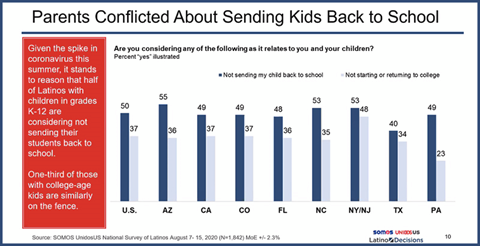Connecticut schools to get additional $160M in state funds – By Krista Birkeland, District Administration
As schools across the nation begin to open for the 2020-21 academic year, one thing is certain—things no longer look the same. Some students are starting the year off virtually, while others are attending virtually or in a blended learning environment. The approach varies from state to state and from district to district. All states are working hard to help their schools and students return to learning in the safest ways possible.
Connecticut Governor Ned Lamont recently announced that the state is making an additional $160 million in funding available for school districts.
“These grants are an essential component to providing the best possible educational opportunities during this uncertain time,” Governor Lamont said in a press release. “Through this program, we are going to be able to offer devices, platforms, and internet connectivity to help with distance learning in lower-income areas for students just beginning their education through college and graduate school, increase access to higher education by expanding scholarship opportunities, and help those seeking vocational training to launch a new career. This global pandemic has changed the education paradigm, and we are fortunate we have this funding to help our state and schools adapt.”
The additional funds are slated to help Connecticut schools safely reopen, assist them with costs associated with responding to COVID-19, and support local operations for the school year.

Seattle Mayor announces $95 million investment for K-12 education – By Kathryn Altena, My Northeast
Seattle Mayor Jenny Durkan announced Monday that the City of Seattle will invest nearly $95 million dollars over six years in K-12 educational supports through the Department of Education and Early Learning’s (DEEL) School-Based Investments (SBI).
In addition, DEEL has awarded $4.9 million over three years to expanded learning and college and career readiness programs.
Both investment packages are funded through the voter approved Families, Education, Preschool, and Promise levy, and will fund programs beginning this school year.
“At the City, we took a hard look at our investments so that we could best serve Seattle students furthest from educational justice,” Durkan said. “We know that access to high-quality education is crucial to closing the opportunity gap and setting students on a path to good-paying jobs.”


Letter from Secretary DeVos Regarding Statewide Assessments – from Mississippi Achieves, MS DOE website
Secretary DeVos Letter to CSSOs 09 03 2020
Dear Chief State School Officer:
During the past several months, we have experienced unprecedented challenges across this nation, and I thank you for your efforts to meet the needs of all your students and safely reopen America’s schools. I’ve benefited from talking with each of you as this pandemic has gone on, and please know that your ideas, contributions, and suggestions have all been put to good use. As we look ahead, I want you to know my perspective on the importance of assessing student performance.
Research shows that school closures this past spring disproportionately affected the most vulnerable students, widening disparities in achievement for low-income students, minority students, and students with disabilities.[1] Almost every student experienced some level of disruption. Moving forward, meeting the needs of all students will require tremendous effort. To be successful, we must use data to guide our decision-making.
Several of your colleagues recently inquired about the possibility of waivers to relieve states of the requirement to administer standardized tests during School Year (SY) 2020-2021. You will recall that, within a very short time, waivers were granted to all 50 states, the District of Columbia, the Commonwealth of Puerto Rico, and the Bureau of Indian Education this past spring following the declaration of a national emergency. That was the right call, given the limited information available about the virus at the time and the need to stop its spread, as well as the practical realities limiting the administration of assessments. However, it is now our expectation that states will, in the interest of students, administer summative assessments during the 2020-2021 school year, consistent with the requirements of the law and following the guidance of local health officials. As a result, you should not anticipate such waivers being granted again.

New Data Reveal COVID-19’s Harsh Toll on Latino Community; 50% of Latino Parents Say They May Not Send Their Children Back to School – By Zoe Kirsch, The 74
School leaders and doctors met Wednesday to unpack newly released data reflecting the disproportionate destruction COVID-19 continues to wreak upon the Latino community — and to address the implications those numbers hold for New York City’s contentious school reopening plan.
“Latinos have been hospitalized four times as much as people who are white,” said American Federation of Teachers President Randi Weingarten, who participated in the event hosted by SOMOS, a New York-based nonprofit network of health care providers. “What we’re seeing, in terms of the start of school, is the kind of neglect from the top down that is unconscionable: the lack of resources to schools to reopen them safely. All of this could have been solved. This kind of work should have started in April.”
As part of the virtual press conference, Matt Barreto, a co-founder of the polling firm Latino Decisions, presented his group’s new data, which were collected between Aug. 7 and Aug. 15 and surveyed 1,842 respondents, 838 of whom have children ages 17 or younger. Most were from Arizona, California, Colorado, Florida, North Carolina, Pennsylvania, Texas and the New York/New Jersey area.
Among the findings: The Latino community encountered a dramatic wave of cases over the summer; 1 in 10 Latino homes around the country has been hit by the virus; more than half of Latino homes have lost income as a result of the pandemic; more than 1 in 3 Latino parents are currently out of work.












